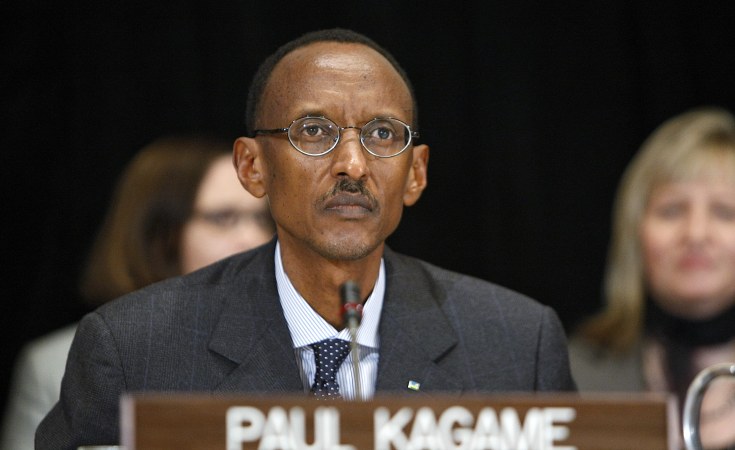At a recent event, Rwanda's president Paul Kagame suggested he might change the constitution to allow him to run for a third term in 2017.
Speaking at an event at Tufts University yesterday, Rwanda's President Paul Kagame gave one the biggest hints yet that he may alter the constitution in order to run for a third term in 2017.
In response to a student's question concerning what role he would play in the country after his current term ends, Kagame responded: "I have been asked when or whether I am going to leave office right from the time when I started. It is as if I am here just to leave. I'm here to do business on behalf of Rwandans ...
"I don't know what else I can give you on that, but let's wait and see what happens as we go. Whatever will happen, we'll have an explanation."
Kagame has led Rwanda since 1994 when the Rwandan Patriotic Front (RPF) took control of the country and ended the genocide against the Tutsis.
For the first six years, Kagame was a de facto head, but he officially took presidential office in 2000 after his predecessor resigned. He then won elections in 2003 and again in 2010.
Under Rwanda's constitution, presidents are limited to two seven-year terms, but ever since 2010, there has been speculation over whether Kagame would hand over the reins of power come 2017.
Recently in Rwanda, the media, which is heavily monitored and censored by the government, has published a number of articles in support of a constitutional amendment that would allow Kagame to run again.
These articles tend to frame the issue as a matter of democracy. One letter to The New Times, for example, advised fellow citizens to remember that "a constitution isn't a straitjacket but a living covenant with built-in rules for amendment as the polity requires.
As long as the necessary minimum proportion of Rwandans required by the Constitution want a revision to that sacred document to cater to fundamental change in national need, then we should all be prepared to accept such change."
Meanwhile, an article last year which followed Kagame's annual Citizen Outreach programmes, in which he meets with communities across the country, described how "residents appealed to the Head of State to remain in office and pledged to vote for him."
The author, a legal scholar based in the capital, concluded: "In many democracies, it is totally justified to amend the constitution principally to advance the broad shared interests of the citizens or in response to nation's exigencies at hand. It even befits more when the amendment is steered by the people themselves."
Repression in and out of Rwanda
To critics of Kagame, such talk of democratic principles is disingenuous. They claim that Kagame's regime has long been characterised by repression, violence and human rights abuses, all sheltered by a silently complicit West.
In the aftermath of the 1994 genocide, for example, RPF forces are believed to have killed around 35,000 Hutus in reprisal attacks.
These "military campaign style mass murders" were catalogued by the UN, but the report was never released, allegedly because of Kagame's close relationship with the US and the guilt the international community felt for not intervening in the genocide.
Kagame's army has also committed large-scale abuses in neighbouring Democratic Republic of Congo (DRC). The motivation for Rwanda's incursions into the DRC, the first in 1996, was to root out Hutu génocidaires who still posed a threat, but the RPF went well beyond this.
According to 600-page UN report, the Rwandan army killed tens if not hundreds of thousands of Hutus, including women and children, in what some claimed could amount to genocide.
Domestically, Kagame has also been accused of violence and repression. Although the country holds elections and claims to be democratic, Freedom House classifies Rwanda as 'Not Free'.
Dissenting newspapers and journalists are not tolerated and claim to be harassed and intimidated. Opposition leader Victoire Ingabire is currently languishing in jail on what many believe to be trumped up charges.
And there have reportedly been several cases of extrajudicial killings. This January, for example, the exiled former intelligence chief, Patrick Karageya, was found murdered in a hotel in South Africa.
In the aftermath, Kagame did little to dispel suspicions that the Rwandan government was responsible when he commented, "You can't betray Rwanda and not get punished for it."
Over the last two decades, Western governments have largely turned a blind eye to Kagame's repressive tendencies.
Many believe this partly because of a sense of guilt at their failure to prevent the 1994 genocide, though as Rwanda specialist Catharine Newbury has pointed out, Kagame is also "extremely adept in speaking a discourse that Westerners want to hear."
Recently, Rwanda's status as an aid darling has started to slip, especially after evidence emerged of its alleged support for the M23 rebels in the eastern DRC, but it remains to be seen how donor countries would respond if Kagame announces he will be running again in 2017.
Similarly, while government-backed Rwandan media paint a picture of widespread support for the strongman, it also remains to be seen how the broader Rwandan population would feel about their president's twenty-year rule being extended by a further seven.
Hilary Matfess is a graduate student at the Johns Hopkins University School of Advanced International Studies, pursuing a degree in African Studies and International Economics.
She has worked as an independent researcher and journalist covering modern African political economies and security issues. Follow her on twitter @HilaryMatfess


